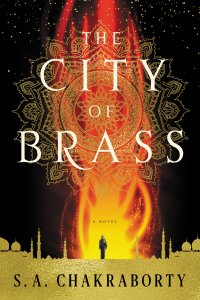Paul Di Filippo reviews The City of Brass by S.A. Chakraborty
The City of Brass, S.A. Chakraborty (Harper Voyager 978-0-06-267810-2, $25.99, 544pp, hardcover) November 2017
 Even disregarding the familiar spectacle of publishers eagerly emulating the bestsellers of their rivals, we can notice that book people like mini-trends. So does the culture in general. No harm to the phenomenon, really, it’s just the way humans operate. Let something fresh become even modestly successful and suddenly the marketplace perceives a hitherto-unrecognized demand, and leaps to fill the new, or ostensibly new, niche.
Even disregarding the familiar spectacle of publishers eagerly emulating the bestsellers of their rivals, we can notice that book people like mini-trends. So does the culture in general. No harm to the phenomenon, really, it’s just the way humans operate. Let something fresh become even modestly successful and suddenly the marketplace perceives a hitherto-unrecognized demand, and leaps to fill the new, or ostensibly new, niche.
Such seems to be the case with fantasies either set in the Middle East (or some avatar thereof) or deriving their tropes from that region. The flourishing of Matt Ruff’s Mirage, G. Willow Wilson’s Alif the Unseen, Saladin Ahmed’s Throne of the Crescent Moon, Salman Rushdie’s Two Years Eight Months and Twenty-Eight Nights, and Helene Wecker’s The Golem and the Jinni, among others, has opened up this sub-genre as a recognizable and publisher-approved category. Whereas once upon a time publishers might have balked at such a book, now they can acknowledge it as a good thing with a defined and likely audience.
The City of Brass, the debut novel by S. A. Chakraborty, falls squarely into this mini-surge, while still proving to be a non-derivative, honorable, well-wrought and entertaining creation. The author exhibits a delightful prose style, producing moments of gravitas, humor and pathos; a vivid imagination; good narrative pacing; a sharp ear for dialogue; a solid grasp of history; and a keen eye for the natural world and mankind’s creations therein. As the first book in The Daevabad Trilogy, it bodes well for both the series and the author’s longer career.
Our venue is, at first, Cairo during the Napoleonic era. And our centering figure is a young woman, roughly twenty years old, named Nahri. She is a guttersnipe of sorts, but utterly smart and self-sufficient, however desperate her conditions. Currently she is getting by at a poverty level with an assortment of tricks: telling futures, practicing folk healing, a little cat burglary. She has no past, no family, and only a few friends of any degree. But Nahri also exhibits a few inexplicable talents: super-fast healing of her own body, an ability to instantly apprehend any new language; and so forth.
One day she is attempting an exorcism for money, thinking herself to be merely faking the ritual. Instead, she legitimately and forcefully summons up Dara, a fire elemental of the type known as a Daeva. Resentful of being interrupted, Dara hijacks Nahri away from all that is familiar. He is soon convinced of her innocence, but at the same time discovers that a bigger game is afoot. He recognizes Nahri to be a shafit, half-human, half-Daeva. Moreover, she seems to be the last representative of a famous line of healers, and hence potentially a person of some importance.
Before you can say “Open, sesame!” ghouls and ifrits are on the tails of the pair, and they are forced, one step ahead of pursuit, to flee Cairo for the only possible refuge: Daevabad, the stupendous, wonderful city hosting all the six tribes of djinns denominated by the legendary King Suleiman. Dara’s tribe is on the low end of the pecking order, for past sins (Dara himself fears what reception he will get upon returning after a long absence), while the Geziri clan currently rules the city, through the al Qahtani family.
This cues the reader up for a shift in narrative POV: our tale will now be alternately told through the perspective of Nahri and that of Ali, the youngest son of King Ghassan al Qahtani. (Ali’s brother, Muntadhir, is the dominating heir.) And so while we witness Nahri’s gradual education (and plunge into love for Dara), we also see the machinations and intrigue of the court, and the rivalries among the six tribes.
Eventually, of course, when Nahri reaches the city, her experiences overlay Ali’s and they are often onstage together. But the dual tracks persist, providing us useful contrasting vantages on events.
As she comes to inhabit her heritage more fully, Nahri finds she is at the nexus of several deadly plots and factions. And as Ali, himself a djinn, gets to know this half-human woman more closely, he begins to reassess the complicity and subservience he has always performed. Dara, meanwhile, pursues his own agenda. Finally, a sprawling supernatural climax, a kind of Clash of the Titans, sorts out winners and losers–but only in an unstable, temporary fashion that will develop further in subsequent volumes.
Chakraborty admirably keeps a number of plates spinning in her story. First, there comes Nahri’s arc, from downtrodden urchin to potential Queen of Daevabad. Her character remains consistent throughout, but expands into new intellectual and emotional areas as she matures and learns and experiences more. (One of the most charming riffs concerns her desire to shed her illiteracy and makes use of the “millions” of scrolls in the palace library.) And then there is the prospect of romance, with two suitors, Dara and Ali, contending against each other in classic romance novel fashion. There’s also a bit of the same kind of relations seen in C. J. Cherryh’s earliest novels, that of warrior pledged to a maiden to whom he dare not confess his love.
The journeys of Ali and Dara are handled equally well. Their contentious relationship allows Chakraborty to also explore the tribal histories and power plays of the various clans, and to enact games of court intrigue. The human-djinn dynamics are also explicated.
Chakraborty also displays great zest in populating her realm with exotic beings and with curious ailments for Nahri to contend with: “It was possible…to transform one’s hands into flowers, to be hexed with hallucinations, or to be turned into an apple…”
But above all she delivers the colorful grandeur and danger and decadence we associate with The Thousand and One Nights style of tales: massive city gates, ziggurat temples, giggling courtesans in a visitor’s bed as a hostly gift. When Nahri and Ali lift down a scroll and fail to defuse its protection, causing it to turn into a deadly giant snake, we might be watching Conan and Red Sonja at play.
With its blend of royal politesse, djinnish magic, human loves and fears, and Middle Eastern Machiavellianism, The City of Brass offers pleasures worthy of Scheherazade.







